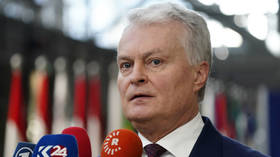Western sanctions ‘ineffective’ – EU state’s president

Western sanctions on Moscow have failed to destabilize the Russian economy, according to Lithuanian President Gitanas Nauseda. Speaking at the Munich Security Conference on Saturday, Nauseda pointed to macroeconomic indicators which plainly signal that the country’s economy remains stable.
According to the latest official figures, Russian GDP climbed by 3.6% in 2023, outpacing both the US and EU, and the country’s authorities expect growth of at least 2.3% this year.
“We have to admit that those thirteen sanctions packages – the thirteenth not yet implemented – basically had a very limited impact on the Russian economy,” Nauseda stated. He noted that Russia has become proficient in circumventing restrictions, and urged the bloc to focus future measures on ways to prevent sanctions evasion.
“It is necessary to strengthen the secondary consequences and ways to circumvent these sanctions, which are so far-fetched that they practically make the sanctions mechanism itself ineffective and empty,” Nauseda said.
The Lithuanian leader also called on Brussels to step up work on ways to use frozen Russian assets for aid to Ukraine.
“We need a much faster decision on what to do with those frozen Russian assets,” he said, noting that the West still cannot find legal means to tap the funds.
The US and EU have frozen around half of the assets belonging to the Russian central bank, an estimated $300 billion, since the beginning of the Ukraine conflict. They have since been mulling ways to confiscate these assets in order to fund aid packages for Kiev. The EU is currently working on ways to seize the income generated last year from the funds held by Belgian-based clearing house Euroclear. The US, meanwhile, has been seeking legal means to seize the assets themselves.
Russia has repeatedly criticized the freezing of its assets, warning of the threat this poses to the global financial system, and vowing retaliation if the West moves to confiscate the funds.













